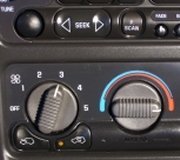Based on your observation of, "making a weird sound", I'd suspect the fan motor has tight bearings and is turning too slowly. That will cause it to draw higher-than-normal current which eventually will burn out the thermal fuse built into the resistor assembly. The common complaint is no fan operation at all, then the resistor assembly is found to be defective. Too many people replace the resistor but don't realize its failure was caused by the fan motor.
The best way to verify this is to remove the motor and try to spin the "squirrel cage" fan by hand. It should easily coast many revolutions before gradually coming to a stop. When the bearings are tight, the fan will stop the instant you stop pushing on it. The additional clue is you won't hear the normal roar of the fan when "high" is selected.
Another test is to measure the voltage across the two motor's wires. One has 12 volts from the ignition switch. The lower the voltage on the other wire, the faster the motor will run. Measure those two voltages and tell me what you find. If the 12 volts is too low, suspect a defective ignition switch or connector terminal. That's the dark green wire at the fan motor.
If you find relatively high voltage on the other motor wire, the black / tan wire, even when the highest speed is selected, suspect a defective fan speed switch. Failure of any motor speed switch is much more common when that motor is used on the higher speeds real often. Heater fan motors are the biggest contributor to ignition switch failures.
Tuesday, January 24th, 2017 AT 5:29 PM



